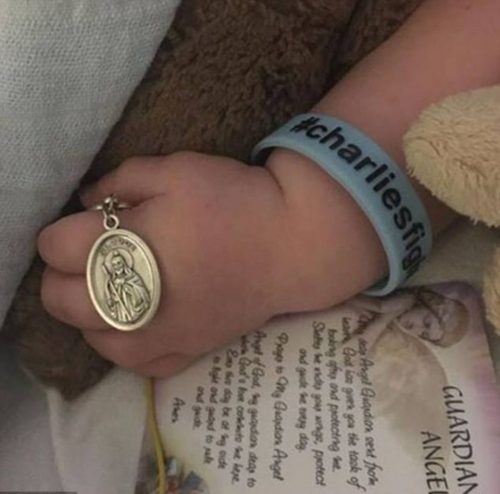Update: here’s my follow-up article discussing the sad epilogue (and the surrounding media obfuscation).
A death sentence for little Charlie Gard. But there’s hope!

I love this photo, I’d like to thank whoever shot it
A 10-month old infant from London, depicted in the photo. Suffering from an extremely rare degenerative disease. UK judges and even the European Court of Human Rights have decided he must be killed, allegedly for his own good. Notwithstanding the efforts made by his parents, even raising the necessary funds to transfer him to the USA to get an experimental treatment, the will of the doctors of the hospital where he’s kept alive with a respirator is that of letting him go. They don’t see his life as worth living.
In a Kafkaesque series of appalling decisions, this euthanasic approach has been transformed into a sort of unassailable, stubborn bureaucratic death machine that you may think nobody can stop.
Hippocratic oath? Doctors decide that it’s not worth it to live like that, with your brain function probably compromised, among other things. Your parents object. Then a judge names a “guardian” as a pro forma representative of your interests, since you’re unable to speak or decide. Of course the guardian sides with the hospital. Hence, since he represent the imaginary personal interest of a subject to be put to death, your parents who want to save you become your counterpart in court!
A human being condemned to die solely for his being gravely ill; often death row criminals are treated with more care and legal safeguards.
Enough with the false pretenses: parents have no standing.
The State is your Master, the ultimate arbiter of life and death. Everything you value, everything you considered a God-given right, even your family and your very life are not really yours. They just happen to have been graciously given to you by the Authorities. A privilege that can always be revoked, depending on circumstances.
But notice! No one can blame evil capitalists in this case.
There’s no shady big corporation, no economical interests involved here.
Those are often important actors, but only in ancillary roles. Money is never the true reason behind a revolution. Never the root of the problem.
Charlie wasn’t going to cost the UK public health service a penny, had they let him go.
The crux of the problem lies in ideology. A projection of Evil.
To hell with all of this. Enough with the niceties. European Institutions: you don’t deserve any respect or loyalty from me.
I provocatively wrote to the now-ironically-named Great Ormond Street Hospital and Children’s Charity that Charlie’s parents should ask for political asylum in the USA, just like anyone who’s fleeing from an oppressive regime, a rogue state. As apparently the United Kingdom has become.
Charlie’s aunt answered my message, stating that unfortunately this is not doable, since they are not already on US soil.
Of course. I know.
But we’d need to shout from rooftops: be prepared, one day you may need political asylum in the USA, maybe in Russia or even in Kiribati. We’re no longer part of the civilized world. Europe is a barbarian that devours its own children.
Courageous politicians would have to declare: Ok, this is not the first such incident, but it’s also the straw that breaks the camel’s back. We no longer recognize a number of international treaties and organisms that try to force us to support inhuman, arbitrary decisions. Beginning with the European Court of Human Rights.
Even better, a civilized nation, expressing a strong, self-confident ethos, would need to put the ECHR judges on trial, hopefully convicting them in absentia. Sending them a clear signal: dear “justices”, be careful. If we catch you on our soil, you’re going to spend a good 20 years in jail. After all Slobodan Milosevic wasn’t that bad, in comparison.
International reactions cause the GOSH doctors to reconsider their options, for now.
Charlie Gard is still waiting.
People across the world (and the web) have managed to make their voices heard. Through prayer, street protests, petitions, phone calls and messages to authorities.
This has had a significant effect; even after the judicial green light, the hospital preferred to “give the family more time”.
According to this logic, this little boy deserves the sweet release that only death could give, to stop him from suffering. But their quest to legally proceed with this undeclared euthanasia, and the consequent reaction on the part of Charlie’s parents to stop them, has already lasted months. Had it been so necessary and inevitable to let him go, why prolong his agony for another week or another month?
No, this baby boy is not the crux of the problem. This story has become all politics. The boy is a pawn.
But notice: our future isn’t set in stone at all. We can mount a successful resistance, through popular participation, in the name of the intrinsic value of every single human life. But we can’t let our guard down, or they’ll resume the course, following the usual rule book: wait until the protest has subsidized and public opinion has moved on, then act according the original plan. Those who care will feel so depressed and powerless that their defeat will be even more momentous then.
As for the Catholic Church, initially members of the clergy were either silent or tone deaf, just like the proverbial Arabs who never miss the opportunity to miss an opportunity.
Case in point: the declarations about Charlie’s case from the English Bishops Conference or the words of Mons. Paglia (again, see what I wrote about him further down here) as head of the Pontifical Academy for Life. Lacking courage, clarity, discernment, a sort of Chamberlainesque appeasement of the counterpart, unable to say anything against the euthanasic decision by the judges.
Eventually a more sound, in-character reaction was necessary, thanks to the pressure coming from the pews.
And not just the statements from champions of the Old Guard like Mons. Sgreccia or Mons. Caffarra.
The Pope himself beat Trump to tweeting a reaction on the subject, although in the most indirect and vague fashion possible (I dare to guess: he felt annoyed and reluctant).
What matters most, the Vatican ordered the Bambino Gesù Hospital to ask the GOSH for a transfer of the child to their care.
Until today we were stuck with the bedeviling answer: “We can’t legally do it, our hands are tied” coming from the voices of British doctors and politicians.
This evening, while I was writing the final draft of this article, the news came that GOSH doctors are asking for a new pronouncement from the judges, in light of the experimental care proposals coming from esteemed colleagues from 2 international hospitals: ostensibly, the new development is based on medical considerations. But we can’t ignore the enormous weight of public opinion pressure, especially from Italy and USA, also causing Trump and the Vatican to weigh in.
Let’s pray they get the opportunity to try and they are eventually successful in giving Charlie some kind of future.
But remember: they are trying to save face, to find a solution that wouldn’t question their right and duty to kill a child in spite of his parent’s protestations.
The evil nature of this kind of power can’t be mitigated by a hopefully benign solution for this case.
Below you can find my original article, examining the greater picture of euthanasia.
Charlie Gard’s case marks a turning point (see here for more examples from the USA, of doctors refusing to care for patients: the point is that at least they weren’t preventing the family from seeking other medical options elsewhere!)
The will of the State is now explicitly trumping on the supposedly free choice of the individual. It’s a gradual process. A slippery slope. You can’t decide to stop it where you think it’d be reasonable.
Lacking a compass
Always start with a joke, they say. I’m not sure I can come up with something right now. But please, go on ahead and help yourself with a hearty laugh, ’cause optimism, you know.
After all, as Ettore Petrolini used to say, we’re just parcels that the midwife mails to the gravedigger.
Seriously, let’s not take ourselves too seriously.
Maybe only a Christian, someone who’s not obsessed with survival because he believes Something More lies beyond this mortal existence, could approach the defense of human life with a serene and realistic approach.
This is one of human psyche’s paradoxes: if you’re an atheist and your life is all you have, it’s not uncommon for you to desire to throw it away once matters turn sour.
On the contrary, if you believe your life isn’t yours to begin with, that it was just lent to you, you’ll probably try to make the best out of it out even under tragic circumstances.
I wrote recently about how the present crisis in the Catholic Church reflects a wider phenomenon, a transformation involving the entire western society, a mad rush to the bottom. A movement that finds in euthanasia its ideal cause, which is quite fitting on a symbolic plane.
In such a wretched culture the voice of Faith, of those who could teach the world about a rationality that stems from love, has become a whisper. Entangled in a web of moral blackmail and mea culpa (self-blame), giving in to the loudest whiners. Here’s the once authoritative Catholic Church often limiting its action to accompanying those who can’t love themselves in their irrational life choices (and doing so in the name of love!). Because they wouldn’t accept any other behavior: a warm embrace is OK, providing that you don’t judge them. When judgment itself has been put off the table, all is left is lucid madness.
I also mentioned Bishop Vincenzo Paglia, apparently eager to (indirectly) set the stage for a normalization of euthanasia, while being called to preside over the empty shell of the Pontifical Academy for Life. Right on cue, his improvident words came just when the Italian media and parliament began their push for a new legislation favoring a gradual introduction of euthanasia.
Meanwhile a few heartbreaking personal stories, of people struggling with euthanasia legislation, are making the rounds all across Europe.
Paglia gave a declaration to the press regarding Charlie’s case that is both depressingly weak and not-so-subtly helpful to those he’d be tasked to oppose in their murderous plans for euthanasia on demand beyond demand.
Euthanasia=suicide+bureaucracy. For now.
The first step, according to the French law and to what is being proposed in Italy, is the concept of medical treatments that may be considered unwanted or disproportionate.
Soon Italians may be asked to declare, through some extra paperwork, what treatments they may or may not want to receive in a future. Based on their feelings, mostly. Influenced through appropriate, schmaltzy “I can’t stand living like that” news stories, while having no clue about the advancements of medicine or what their personal conditions will possibly be a few decades from now…
The resulting “living will” will gradually morph into giving formal instructions to let them die. But the transformation doesn’t stop there. The next step will be okaying being killed if they’re close to their demise anyway; after that, euthanasia will be associated with excessive suffering.
Then we’ll get into outright suicide legalization, due to a grave disability, psychological problems, eventually even without a specific reason.
There’s no solid boundary separating euthanasia and killing oneself in an act of foolish despair. There’s a wide spectrum of cases, ranging from those who are almost dead and semi-conscious, to people who are in perfect health and would only need a few slaps in the face to beat some sense into their heads.
Subtly change the public perception of life, and your beloved commoners will desire suicide as a solution to a great many problems.
It’s like opening a hole in a dam.
One of the common ploys, for instance in the proposed Italian law, is that of shifting the goalposts. Baby steps include killing a minor without obtaining some form of consent as in Charlie’s case, putting doctors in a difficult position (fearing being sued for unlawful survival), defining nutrition, respiration ad hydration as if they were medical treatments.
You may be young and athletic, defiant and dynamic, horrified by the idea of your hypothetical future self chained to a hospital bed. You may declare that you’d prefer death to being fed through tubes.
Then, many years down the road, a doctor who could have tried to save you, lets you die of thirst to respect that “choice”. A choice that could have changed in the meantime.
Suppressing the weak?
But wait, there’s more.
While they are at it, a new principle will emerge, that of limiting care and facilitating death, irrespective of the will of the poor thing. Initially as a compassionate measure for exceptional cases; then as a routine practice; eventually codified in the law.
At least thanks to budget cuts to socialized medicine, but also due to cost considerations for insurance companies.
In European Social-democracies people tend to imagine public health services as “free”. Well, they’re becoming increasingly expensive, especially for intensive care and terminal patients.
Administrators are already cutting corners left and right, and the quality of the services is going south.
Are you really so stubbornly attached to life? Do you really insist on receiving such complicated treatments? Well, if you’ve got gobs of cash… But if you’re so old, what’s the point? Even if you possess some 100 thousand dollars for a surgery that may let you live another 5 years, and in bad shape to boot… do you really want to take advantage of your grandchildren? If you opt for a dignified demise, they’ll get the opportunity to cry a bit, then they’ll get over it. From time to time they’ll enjoy bittersweet moments recalling memories of the days spent with you… and with the 100 quid they could buy a small flat!
But no, you’re so selfish that you’re clinging to a useless and pitiful life, plus not only you’re taking away all that money from them, but you’re forcing them to waste the best years of their lives to attend to your miserable carcass…
See how it’s easy to build a perfect moral blackmail scenario where the whole meaning of love, piety and respect have been completely subverted?
A life worth living: one where it’s unthinkable to turn down a crazy weekend in Ibiza to stay home with your grandpa who’s stuck looking out of that one window all day every day, who’s always repeating the same confused stories.
If everything boils down to your personal rights, me-me-me, the entire world becomes a smorgasbord of selfishness, incessant demands and violent fights.
Eventually the law of the strongest is shrouded in formalism and is called justice. The New And Improved Justice, where all that matters is the box they put you in.
If you’re part of the refuse…
This metamorphosis causes a wide spectrum of adverse effects, including a significant decline in medical research and quality of care. For everyone of us.
This article (in Italian) is from a lawyer explaining, among other things, how doctors in a future will be unable to follow their oath to give proper care to their patients; their main concern will be averting the risk of saving someone who doesn’t want to be saved, ostensibly because he wouldn’t probably make a full recovery. The deceased are way less inclined to sue their doctors than the chronically ill.
It’s worth insisting on this elementary concept: it’s a .
Just conspiracy theories? Not at all!
There’s been scores of examples through recent years validating my concerns.
I remember a few years ago reading about a trend developing among the elderly in Denmark. If they had to go to a hospital, they typically chose to go to Germany, in order to obtain proper medical care: they feared, with good cause, they’d be left to die by the Danish authorities, even when not gravely ill, due to a budget choice: evaluating the appropriateness of a costly procedure on the basis of the age of the patient.
The most glaring example of the euthanasia mentality is represented of course by the Netherlands, but more and more countries are joining the party, notably Belgium and Switzerland. There’s a law proposal by the Dutch government that aims at guaranteeing euthanasia for candidates who aren’t even ill. It goes without saying:
«rigid conditions» apply, «rigorous criteria» should be respected, in order to guarantee a «decorous» end of life.
Yeah, right.
The rigid conditions of the last time are put on the back-burner; new ones are introduced; of course, they’re more advanced. A step further.
They say the road to hell is paved with good intentions, but now it’s also peppered with nice and sturdy goalposts.
There’s this case of one elderly woman suffering from Alzheimer’s: they asked her husband to restrain her in order to give her a lethal injection while she was trying to resist, because she repeatedly expressed her desire to be spared, but her only legally valid will was the one she gave in the past, when she wasn’t ill yet…
It’s a sort of unstoppable legal death machine. If you’re labeled as part of the “mental patient” category, you can’t change your mind, you should die anyway. What a wonderful way for a married couple to bid farewell to each other: in your last breath, you see your husband who’s keeping you down while the doctor kills you…
It’s just delusional to imagine a future in which euthanasia has been normalized and yet somehow worse things fail to happen.
The utter disregard for human life shown by Dutch doctors is just the beginning: in today’s societies they are still facing significant hostility. Propaganda tactics apply then. They’re restraining themselves, for now. Yet, look how far they already got!
We should listen to Professor Theo Boer’s testimony. He was originally one of the experts supporting the introduction of the Dutch euthanasia law, a member of one of those pensive commissions theoretically guaranteeing an impeccably rigorous and decorous application of the rules (here’s my translation of his words from this Italian article):
I was terribly wrong when I thought that a well regulated euthanasia could work.
An increasing number of people choose assisted suicide or active euthanasia just because they’re old or lonely. Some of them could have lived for years or decades. Euthanasia is often requested due solely to the psychological pressure coming from relatives and the victim’s desire to see them happy.
Right when Charlie Gard’s case was gaining international attention, another case involving a 15 months old girl in France was making the news. She sustained significant brain damage and was receiving life-saving treatments.
She was, too, at the center of a legal dispute, with her parents and their “irrational obstinacy” on one side trying to save her, doctors on the other asking for a legal permission to …terminate her. Eventually the judges ruled in her favor. Which is a happy turn of events. But we must remember that, although the French law doesn’t technically allow euthanasia, determined people could maneuver around it in a way as to permit willing judges to order life support termination for patients that are neither terminal, nor unconscious.
Again, legal struggles over the forceful termination of an innocent life.
Remember Terri Schiavo in 2005? There was a similar case in Italy in 2009, involving Eluana Englaro, a girl that was locked in (just like Terri) in a state that could be mistaken as total lack of consciousness, except it wasn’t, if you were looking for clues.
Terri’s husband wanted her dead, insisting that he knew she expressed such desire in the past. For Eluana the story is roughly the same, only it was the father asking for her to be killed, insisting she had already died 17 years before, in the car accident that incapacitated her.
A curious form of compassion indeed: a stubborn, blind authority you can’t fight, a Kafkaesque Trial where some close relatives desperately try to navigate through a labyrinth of formal obstacles.
A few days ago the news came that the judges from the Italian Council of State (legal consultive body) condemned the Italian State itself (through the Lombardy Region Administration) to pay more than 130 thousand Euros in damages to the father of Eluana Englaro, for the Administration’s grave sin of refusing to kill her (she was eventually starved to death in a clinic in another Italian region). This is what it seems to have come down to: the euthanasic mentality is so deeply rooted in our institutions, the unfettered judicial activism so pervasive, that the law punishes those who refused to violate the law, while apparently they should have (!), in order to follow the inevitable progress. Disgusting, maddening.
If you really enjoy being part of the next wave, if you feel all warm and fuzzy for expressing your moderate opinion: “Personally I’d never ask for euthanasia, but I think everyone should be given the opportunity to choose how they’ll die”, well think again: you’ve been enrolled in the ranks of the useful idiots. Those who imagine that during a siege they could open the main door of the castle, but just a little bit, leaving it ajar. And they’ll be the first in line to die, crushed by the charging invaders.
A vital distinction: if a condition was initially presented as necessary, it will become sufficient.
Please notice the special scenario euthanasia proponents always try to depict. There seems to be a superabundance of motivations, in fact the subject:
1. had declared in the past that he’d rather die if he’d ever end up under the present predicament
2. he’s dying anyway
3a. he’s in terrible pain
or
3b. he’s completely unconscious: just as good as not being there anymore
4. his life is “not really life”: gut-wrenching, lacking any control, devoid of dignity.
That’s how, if you don’t support euthanasia, you may feel like an egotist who desires to inflict unbearable and meaningless suffering on strangers, while chasing ghosts of ancient ethical theories.
But let’s get back to Terri Schiavo and Eluana Englaro: #1 is anything but clear-cut (the will to die had been allegedly expressed in the past, but only according to the testimony of a close relative who wanted euthanasia to be performed); #2 isn’t really applicable because both could have survived for years. #3a is not relevant here, but remember that a proper way to deal with pain is through palliative care and painkillers: death isn’t necessary at all. #3b is greatly contested, in fact we can easily find both cases of actual cerebral death where the problem is just that some relatives can’t accept the harsh reality, and cases like Terri and Eluana, declared as being “long deceased” whereas they were faintly signaling their still being at least partially conscious.
Take the controversial case of George Pickering: a father pulling a gun to keep doctors from pulling the plug on his (allegedly already declared brain dead) son. Organ donation preparations already underway.
After a dramatic hospital standoff and after serving a year in jail he had a son at home to be reunited with.
Last but not least, point #4: this is all about being unable to face discomfort, embarrassment, all the physical limitations that mark your flesh with a vivid demonstration of how life can be hard.
Quite understandable, we’re humans: being unable to control one’s bodily functions, to move, to live a normal life: extremely distressing. You want to run away. To end it all. Understandable, yes. But we can’t allow this attitude to become a societal principle: that would deal a mortal blow to the fabric of a society. A culture of being unable to cope.
There’s more.
The superabundance of motivations doesn’t mean that, thanks to rigorous protocols, only fringe cases will get a merciful death, when both the patient’s conditions are desperate and his/her will point in that direction.
The exception becomes the rule, this is indeed an observable fact if you consider what happened with other examples of cultural revolutions.
Just meeting one of the conditions will be treated as a sufficient cause for the procedure.
You thought they were restrictions, they served instead as starting points.
Therefore it will NOT be the case of 1 AND 2 AND 3 AND 4, or “helping” someone who simultaneously
1. wants to die,
2. is already dying,
3. is caught between excruciating pain and unconsciousness,
4. is losing dignity, experiencing and causing anguish, in a condition that you’d hardly call humanely tolerable.
But instead 1 OR 2 OR 3 OR 4: condemning/killing anyone who
1. wants to die while perfectly healthy (maybe his/her suicidal instinct was inspired by this very nihilistic, revolutionary culture); or
2. wants to live, but he/she’s quite old, even if in decent health; or
3. wants to live but is experiencing intense pain / isn’t (possibly) mentally fit / we doubt will ever recover from a coma; or
4. wants to live but the normals see in him/her only a wretched carcass whose life isn’t worth living. Truth is, they are disgusted by the sight of people who lost control of their bodies. They want them to disappear, and quickly.
Deep inside you know this is true: even if we won’t get to these extremes, this is the direction we’re heading in; if we’ll avert the fall into the abyss, you’ll need to thank those stubborn bigots like yours truly, shouting from the rooftoops that we need to stop the downward drift.
Don’t be distracted by fleeting details. Laws can be changed, best practices are bent. The point is on one side of the scale we have a vision, upholding the sanctity of life, which is quite effective (through actual results) only if supported by a strong culture and only if it’s not attacked directly, for its being very subtle and difficult to defend, since its positive effects are indirect and visible in the long term.
While on the other side of the scale we have
A. a humongous economic incentive to eliminate millions of people whose care could cost a fortune, especially in a demographically unbalanced western society, with too many elderly citizens to cover.
B. a well orchestrated, emotional message involving the masses.
Let’s retake control of our humanity.
False piety, false courage, false freedom. A concept like “the quality of life” has hardly any meaning, beyond a hollow desire to maximize pleasure while running away from uncomfortable questions regarding the meaning of said life. It’s about becoming less and less capable to face adversities. Egotistical. Filled with resentment against a relative who’s not dead already.
Proudly resigned, superficial, controlled through the spread of predictable gut reactions. Hiding behind words.
Here’s the thing. Please, say no to all of this.
These are difficult topics, things we don’t want to deal with.
Actually, if you take the bull by the horns you may discover it’s a liberating experience.
The next time your uncle, or maybe a colleague, comes up with the stale trope of “not wanting to die miserably hooked to a machine, with tubes coming out of their body”, don’t turn away in the name of diplomacy and good manners. An unpleasant squabble is way better than becoming isolated and desensitized, letting our society rot.
Please share this page. Or other worthwhile pages on the subject.
The first gas chambers were constructed in 1939, to implement a Hitler decree dated September 1 of that year, which said that “incurably sick persons should be granted a mercy death”. The word for “murder” was replaced by the phrase “to grant a mercy death”
Hannah Arendt, A Report on the Banality of Evil, 1964










































